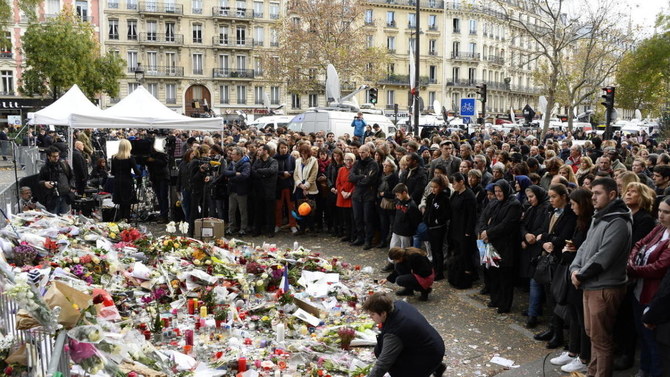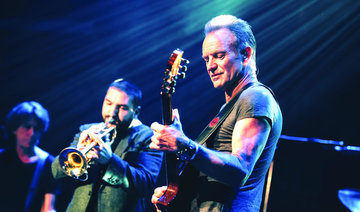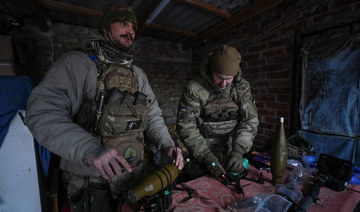PARIS: The trial of 20 people charged over the November 13, 2015 extremist attacks in Paris that were France’s deadliest peacetime atrocity will get underway in late 2021, sources close to the case and prosecutors said on Friday.
The night of carnage on November 13, 2015 saw 130 people killed and 350 wounded when suicide bombers and gunmen attacked the Stade de France stadium, bars and restaurants in central Paris and the Bataclan concert hall.
The trial in Paris will begin on September 8, 2021 and end in March 2022, lawyers were told at a meeting at the Paris court. National anti-terror prosecutors confirmed the dates to AFP.
Just one of the suspected perpetrators — French-Belgian Salah Abdeslam — will appear in court with the 19 others accused of providing various logistical support. Six of them are targets of arrest warrants and will be tried in absentia.
The other attackers, including the suspected coordinator of the attacks — Belgian Abdelhamid Abaaoud — were killed in the wake of the strikes which were which were claimed by extremists from the Daesh group.
The trial will be a massive undertaking, with 110 days of hearings envisaged. It had been expected in January 2021 but was put back due to the coronavirus pandemic.
The announcement of the beginning of the trial comes with the country again on its highest security alert following three attacks in the last months blamed on extremists.
In September, the trial had got underway of suspected accomplices in the massacre by gunmen in January 2015 of staff on the Charlie Hebdo satirical weekly, which had published cartoons of the Prophet Mohammad.
True to its defiant reputation, the magazine then republished the cartoons to mark the start of the trial.
In the wake of that move, a Pakistan-born man wounded two people with a meat cleaver on September 25 outside Charlie Hebdo’s former offices.
Teacher Samuel Paty, who had shown his class the cartoons, was beheaded outside his school on October 16 by a radical from Chechnya. And on October 29 a man recently arrived from Tunisia killed three people with a knife in a Nice church.
In the wake of those attacks President Emmanuel Macron presented draft legislation on cracking down on extremist activity and vowed France will never renounce the right to blaspheme, in moves that have drawn anger in some Muslim countries.
Trial over deadly Paris extremist attacks to begin late 2021
https://arab.news/nh6jh
Trial over deadly Paris extremist attacks to begin late 2021

- Just one of the suspected perpetrators — French-Belgian Salah Abdeslam — will appear in court with the 19 others accused of providing various logistical support
- The announcement of the beginning of the trial comes with the country again on its highest security alert following three attacks in the last months blamed on extremists
German court convicts a Palestinian man of murder over a fatal stabbing on a train last year

- Psychiatric expert testified during the trial that the defendant had psychotic symptoms and post-traumatic stress disorder
The state court in Itzehoe convicted the 34-year-old Palestinian, who has been identified only as Ibrahim A. in line with German privacy rules, of murder and attempted murder, German news agency DPA reported.
It found that he fatally stabbed two teenagers and wounded another four passengers seriously in the Jan. 25, 2023 incident in the northern town of Brokstedt, before being overpowered by others on board the regional train traveling from Kiel to Hamburg.
The defendant grew up in the Gaza Strip and came to Germany in 2014.
A psychiatric expert testified during the trial that the defendant had psychotic symptoms and post-traumatic stress disorder, but could be held criminally responsible for his actions. The defense lawyer had called for his client to be moved to a psychiatric institution.
Investigators have said the man had a previous criminal record and had been in pretrial custody in another case before being released days ahead of the attack. He had traveled to an appointment with immigration authorities in Kiel and prosecutors have said he appears to have acted out of frustration.
The severity of the case meant that he likely won’t be eligible for release after 15 years as is usually the case in Germany.
Sri Lanka says 16 citizens killed fighting in Ukraine war

- Soldiers from Sri Lanka’s regional neighbors India and Nepal have also signed up to fight since last year
- Sri Lanka opened an inquiry last week into the recruitment of its citizens for the conflict
COLOMBO: At least 16 Sri Lankan mercenaries have been killed fighting in the war between Russia and Ukraine, the island’s deputy defense minister said Wednesday.
Tens of thousands of Russian soldiers have been killed in Ukraine since the invasion began more than two years ago, and Moscow has been on a global quest for more troops.
Soldiers from Sri Lanka’s regional neighbors India and Nepal have also signed up to fight since last year, with several confirmed deaths in combat from citizens of both countries.
Sri Lanka opened an inquiry last week into the recruitment of its citizens for the conflict that has since identified the participation of 288 retired soldiers from the island nation, deputy defense minister Pramitha Tennakoon said.
“We have confirmed information about 16 who have been killed,” he told reporters in Colombo.
Tennakoon did not say which side of the conflict the soldiers had been fighting on.
But ruling party lawmaker Gamini Waleboda told parliament on Monday that most had been recruited to fight alongside the Russian army.
Those who joined had been duped with promises of high salaries and falsely told they would be given non-combat roles, Waleboda said.
Tennakoon said the recruitment of Sri Lankans was being treated as a human trafficking enterprise and urged military officers not to fall prey to the recruitment drive.
The Sri Lankan government was also in talks with both the Ukrainian and Russian foreign ministries to track down Sri Lankans in the two countries and bring them back safely.
“This is a delicate issue,” Tennakoon said. “We are friends with Russia, we are friends with Ukraine. Both are important for us so we are talking to the foreign ministries to get our people back safely.”
Complaints began pouring in from relatives after the defense ministry established its probe last week to collect information on those who had traveled to both countries to join the war effort.
Sri Lanka has repeatedly warned its citizens against traveling to Russia or Ukraine to join the fighting.
But there are no restrictions on Sri Lankans traveling abroad and large numbers have left in the wake of an unprecedented economic crisis in mid-2022.
Police arrested two retired army officers, including a major general, last week for illegally acting as recruiting agents for Russian mercenary firms.
India and Nepal have also confirmed that numerous citizens of those countries had been recruited to fight alongside the Russian army over the past year.
At least 19 Nepalis had been killed in combat, according to figures from the Himalayan republic published in March.
Russia’s army held off a much-hyped Ukrainian counter-offensive last year and it has since made gains as Kyiv struggles with ammunition and manpower shortages.
Russia suspends traffic at two airports over drone threat

- Ukrainian forces have in recent weeks escalated aerial attacks on Russian border regions
- Russia earlier said it had neutralized 17 Ukrainian drones overnight
MOSCOW: Russia said Wednesday that a major airport near the city of Kazan, 1,000 kilometers (620 miles) from Ukraine, had been temporarily closed after the region was targeted by a Ukrainian attack drone.
Ukrainian forces have in recent weeks escalated aerial attacks on Russian border regions but have also been able to strike targets deep inside Russian territory.
The defense ministry said it had downed a Ukrainian drone over the central region of Tatarstan but did not specify what was the target of the attack.
Two airports in the region, including in the major hub of Kazan, were temporarily closed around the same time, Russian aviation body, Rosaviatsia announced.
“To ensure the safety of civil aircraft, temporary restrictions have been imposed on the work of two airports in Tatarstan — Kazan and Nizhnekamsk,” state news agencies cited the agency as saying.
Russia earlier said it had neutralized 17 Ukrainian drones overnight as Kyiv targeted a fuel depot in the southern city of Rostov, home to Moscow’s military headquarters for its operation in Ukraine.
Russian aerial defense systems intercepted and destroyed 17 drones across several border areas, as well as 10 ATACMS missiles over the annexed Crimean peninsula, the defense ministry said.
Two drones caused explosions at a fuel depot in Rostov without setting off a fire or wounding anyone, local governor Vasily Golubev said on Telegram.
More than two years into the conflict on its territory with its larger and more heavily-armed neighbor, Ukraine has regularly targeted Russian energy facilities and fuel supplies.
Kyiv argues that these attacks are justified as the facilities are used to supply the Russian army.
Ukraine has vowed to take the battle to Russian soil after suffering massive destruction on its territory from more than two years of bombardments.
UN launches probe into first international staff killed by unidentified strike in Rafah

- Retired Indian army officer Waibhav Anil Kale was on route to European Hospital when killed
- Kale was working with the UN Department of Safety and Security, his colleague also injured
NEW DELHI: The United Nations has launched an investigation into an unidentified strike on a UN car in Rafah on Monday that killed its first international staff in Gaza since Oct. 7, a spokesperson for the UN Secretary General said.
The staff member, a retired Indian Army officer named Waibhav Anil Kale, was working with the UN Department of Safety and Security and was on route to the European Hospital in Rafah along with a colleague, who was also injured in the attack.
Israel has been moving deeper into Rafah in southern Gaza, where more than a million people had sought shelter, and its forces pounded the enclave’s north on Tuesday in some of the fiercest attacks in months.
Israel’s international allies and aid groups have repeatedly warned against a ground incursion into Rafah, where many Palestinians fled, and Israel says four Hamas battalions are holed up. Israel says it must root out the remaining fighters.
In a statement on Monday after Kale’s death, UN Secretary General Antonio Guterres reiterated an “urgent appeal for an immediate humanitarian ceasefire and for the release of all hostages,” saying the conflict in Gaza was continuing to take a heavy toll “not only on civilians, but also on humanitarian workers.”
Palestinian health authorities say Israel’s ground and air campaign in Gaza since Oct. 7 has killed more than 35,000 people and driven most of the enclave’s 2.3 million people from their homes.
His deputy spokesperson Farhan Haq said on Tuesday the UN has established a fact-finding panel to determine the responsibility for the attack.
“It’s very early in the investigation, and details of the incident are still being verified with the Israeli Defense Force,” he said.
There are 71 international UN staff members in Gaza currently, he said.
In its only comment on the matter yet, India’s mission to the UN confirmed Kale’s identity on Tuesday, saying it was “deeply saddened” by his loss.
Israel, which launched its Gaza operation after an attack on Oct. 7 by Hamas-led gunmen who killed some 1,200 people and took more than 250 hostages, according to its tallies, has ordered civilians to evacuate parts of Rafah.
The main United Nations aid agency in Gaza, UNRWA estimates some 450,000 people have fled the city since May 6. More than a million civilians had sought refuge there.
India’s Modi denies stoking Hindu-Muslim divisions to win election, files nomination

- Modi began campaign by showcasing his economic record, governance and popularity
- Changed tack after the first phase to accuse opposition Congress of being pro-Muslim
NEW DELHI: Indian Prime Minister Narendra Modi defended himself against criticism that he is stoking divisions between Hindus and Muslims to win national elections as he filed his nomination on Tuesday for re-election from one of Hinduism’s holiest cities.
India began voting April 19 in the seven-phase election in which Modi, 73, is seeking to be the second prime minister to win a third straight term since independence leader Jawaharlal Nehru.
Although Modi began his campaign by showcasing his economic record, governance and popularity, he has changed tack after the first phase to accuse the main opposition Congress party of being pro-Muslim.
Analysts say this was likely aimed at firing up the base of his Hindu nationalist Bharatiya Janata Party after a low turnout in the first phase sparked doubts that BJP and its allies could win the landslide that the party sought.
“I believe people of my country will vote for me,” Modi told broadcaster CNN-News18 in Varanasi, his parliamentary constituency in the northern state of Uttar Pradesh.
“The day I start talking about Hindu-Muslim (in politics) will be the day I lose my ability to lead a public life,” Modi said, speaking in Hindi. “I will not do Hindu-Muslim. That is my resolve.”
Modi’s critics often accuse him and BJP of targeting minority Muslims to please their hard-line voters, which he and the party deny.
While Hindus make up about 80 percent of India’s 1.4 billion people, it also has the world’s third-largest Muslim population of about 200 million.
Congress has complained to the Election Commission that Modi made “deeply objectionable” comments about Muslims in an April 21 speech, violating poll rules. The commission has sought a response from the BJP on the complaint.
In that speech, Modi accused Congress of planning to do a wealth concentration survey, seize properties and redistribute them, which Congress has denied.
He said at the time:
“During their (Congress) previous government, they said that Muslims have the first right on the wealth of the nation. That means, who will they redistribute this wealth to? They will give it those who have more children, to infiltrators.”
On Tuesday, Modi said he did not name any community in that speech, even as he continued to focus on the theme.
“I have neither said Hindu or Muslim. I have said you should have as many children as you can support,” Modi said.















